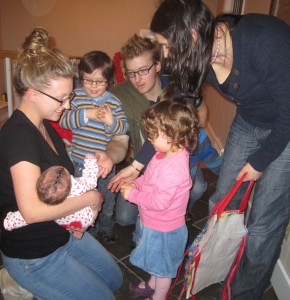 Some days go exactly as planned. Others seem to belong to someone else’s life. For example, as we were preparing to go to Sunday morning church yesterday, we ended up at a hospital ER instead. It wasn’t a big emergency and all is well now, but there’s nothing like a trip to the hospital to reignite gratitude for the many days we don’t end up there.
Some days go exactly as planned. Others seem to belong to someone else’s life. For example, as we were preparing to go to Sunday morning church yesterday, we ended up at a hospital ER instead. It wasn’t a big emergency and all is well now, but there’s nothing like a trip to the hospital to reignite gratitude for the many days we don’t end up there.
During this last year God has been training me to dig for reasons to be thankful in every situation, always. In the process, I’ve asked him a lot of questions:
“You mean if I’m having a heart attack, I’m supposed to be thankful?”
“Yes,” is his answer. “In all circumstances, even a heart attack.”
“What about if a grandchild gets badly hurt?”
“Look for me in it,” he says.
“If someone precious dies?”
“Watch for my blessing.”
“But surely you don’t mean we’re to be thankful for tragedy!”
“I do,” he says, “because I’ll bring good from it.
This kind of thinking goes against us. In fact, it grates on us. It seems upsidedown and definitely isn’t fair. So why does he ask this of us?
As always, he has a good answer. Actually, lots of them. Today I offer 10 of his reasons to follow this strange advice:
- Because he recognizes that being thankful is often difficult, even sacrificial, and appreciates our willingness: “Offer to God a sacrifice of thanksgiving.” (Psalm 50:14)
- Because we’re going against the norm when we thank God in our misery, and others notice: “For who sees anything different in you?” (1 Corinthians 4:7)
- Because when we’re struggling, he wants us to identify those helping us: “I urge that… thanksgivings be made for… people.” (1 Timothy 2:1)
- Because it’s a way to show God we love him: “You are my God, and I will give thanks to you.” (Psalm 118:28)
- Because searching for blessings drives us to Scripture: “Let the word of Christ dwell in you richly… with thankfulness in your hearts to God.” (Colossians 3:16)
- Because we need to remind ourselves continually it’s God we should thank: “Giving thanks always and for everything to God the Father in the name of our Lord Jesus Christ.” (Ephesians 5:20)
- Because being grateful in hardship acknowledges we’re confident God is still in charge: “Let us be grateful for receiving a kingdom that cannot be shaken.” (Hebrews 12:28)
- Because we demonstrate that even if it seems God doesn’t like us anymore, we believe nothing can separate us from his love: “His steadfast love endures forever!” (Psalm 107:1)
- Because when we show a willingness to find blessings in hardship, it glorifies Him: “The one who offers thanksgiving as his sacrifice glorifies Me.” (Psalm 50:23)
- Because if we follow his instructions, we’ll be at peace: “Let the peace of Christ rule in your hearts.” (Colossians 3:15)
“Give thanks in all circumstances; for this is the will of God in Christ Jesus for you.” (1 Thessalonians 5:18)




